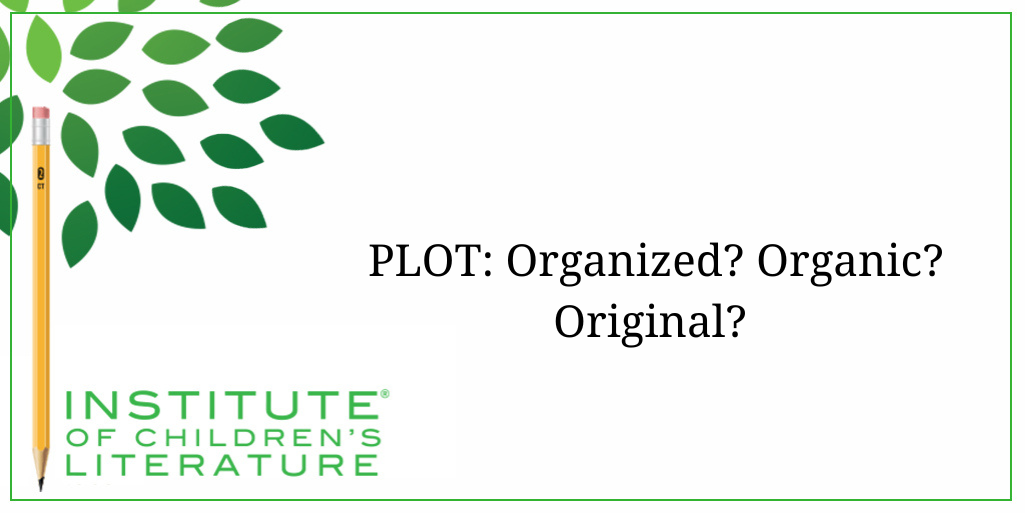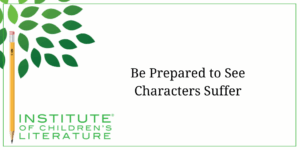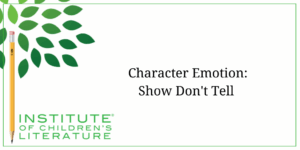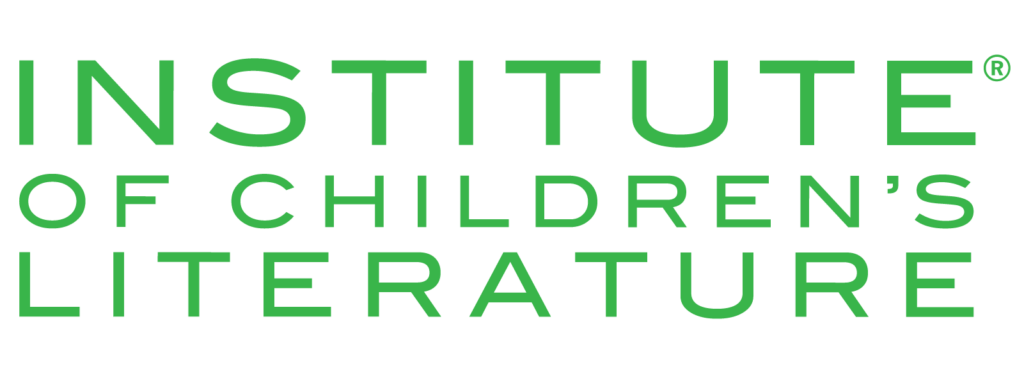
- Date: June 19, 2025
- Author: Jan Fields
- Category: Writing for Children Blog
- Tags: original, outline, plot
We teach our students how to write and get published!
View our Course Catalog >
PLOT: Organized? Organic? Original?
When writers think about organization, they usually assume it belongs in the world of nonfiction writing. After all, nonfiction needs to be organized, so that readers can best receive and absorb the information. When it comes to nonfiction, we accept that clear organization makes for better reading because it lessens confusion. And actually, the same is true of fiction. 
Learning Organization
Organization boils down to how you tell the story. It's not a method of limiting the story you tell, because you have many different options in how you organize your scenes and plot points. For example, you can open the story with an exciting moment from deep within the story, then jump back to the beginning of the story and begin moving forward. This organization style is extremely common in screen plays, and in high interest, fast paced genre like science fiction and adventure, because it allows the story to grab the reader quickly with something intense and interesting. Then it uses the lure of curiosity to keep the reader connected as the story returns to the beginning.
Another organization option might be starting the story in the middle, then continuing from that point, but using flashbacks sprinkled throughout the narrative to “catch the reader up” on everything that happened to that point. This second method of organization allows you to skip past the less exciting parts and give them in tiny sips via flashbacks to keep the reader connected. Though these methods run the risk of being confusing compared to a straight beginning to end plot with no flashbacks or time jumps, they can be ways of keeping a reluctant reader engaged if the author handles them carefully. Every organization choice you make has pluses and minuses, usually based on keeping readers excited and involved while limiting confusion.
By the way, confusion is different from simply not telling the reader everything. A confused reader can’t sort out what's going on right now in the story so the scene you're creating becomes meaningless. The reader feels lost and confused. The scene feels incomprehensible to a confused reader and the characters don't matter. In contrast, a story that makes logical sense, but doesn't tell the reader everything at every moment isn't confusing, it's intriguing and stimulates curiosity.
Readers have questions, but they are still able to move through the story with you because the questions are those that don't need answers to make sense of what is going on in each moment. So, the balance with organization is usually one of what the reader needs vs. too much information/telling so that your plot piques curiosity without inducing confusion.
Since organization is at the heart of the confusion/curiosity balance, it is about making the story readable. It requires the writer figure out what questions need to be answered right now to make this particular scene engaging. It's about writing like a reader (or revising like one anyway). Your first draft is almost certainly going to need some work in organization so that you don't lose the reader at any point, and it may be helpful to find an honest reader who can tell you when the balance between curiosity and confusion tipped away from keeping that reader engaged.
Does That Mean I Need to Outline?
 One of the huge debates in fiction writing, especially among novelists, is whether it's better to do a lot of pre-writing (chapter-by-chapter synopsis or outline, for instance) or do as little pre-writing as possible and simply dive in. The reality is that both work well, and neither precludes the need for the final plot to have a well-thought-out organization. Organization can come after the writing of the first draft is complete and the totally organic (fly-by-the-seat-of-your-pants) writer begins the much-needed rewrite that brings order out of the chaos. The organic writer is usually an organized rewriter.
One of the huge debates in fiction writing, especially among novelists, is whether it's better to do a lot of pre-writing (chapter-by-chapter synopsis or outline, for instance) or do as little pre-writing as possible and simply dive in. The reality is that both work well, and neither precludes the need for the final plot to have a well-thought-out organization. Organization can come after the writing of the first draft is complete and the totally organic (fly-by-the-seat-of-your-pants) writer begins the much-needed rewrite that brings order out of the chaos. The organic writer is usually an organized rewriter.
Organic writing has levels. Some writers honestly put butt in chair and jump right into a scene with only the vaguest idea about premise or with only one character they've given thought to. Other writers do extensive pre-planning, knowing all the characters and their backstories and all the settings long before jumping into any writing. They may even know what scenes they'll need to write to make the plot work.
That doesn't mean those writers don't leave room for organic writing. Sometimes a writer who has done a great deal of pre-writing will be surprised during the writing process when a different, unplanned act happens, or a bit of dialogue takes an unexpected turn, or a character insists upon showing up right now instead of later. Those are all organic choices and can take a plot in an unexpected direction.
Every writer needs to leave room for a certain amount of organic creation. Without that, the work will feel, and sound, stilted and mechanical. Dialogue will lose the sense of “real speech.” In dialogue, the similarity to real conversations is always an illusion, but it's an illusion you want readers to experience. For a strongly organized writer, it can be frustrating when the story takes an unexpected turn that feels true and natural. It means you're now venturing into the unknown and unplanned. You'll be writing in a direction you didn't plan. And it means you're going to need some new planning from this point to keep the plot logical and readable, but resisting organic changes can also close the door on wonderful discoveries. Serendipity is a part of the writing process, and the smart writer makes room for it, even if it disrupts pre-writing organization plans.
If you have to make room for the story to change in small or large ways, what is the value of ever doing pre-planning? For me, as a writer who often works from a chapter-by-chapter outline/synopsis, all that preplanning prevents me from losing momentum. I know ultimately where the plot will land. It may not end exactly like my outline suggests but it will be in the vicinity, assuming my pre-writing was decent.
Outlines also help guide my research, so I have a ton of information in my mental pocket, and I won't need to stop my writing to go track down the year a big storm hit the region I'm setting the story in, or what the duties of a kid working in a mom-and-pop grocery probably included. Much of my research happens in my pre-writing and that helps make the writing much smoother. Now, of course, if my writing goes off in a direction that never makes use of some kernels of research, that's fine. Or if I still have to stop now and then to check out a fact, that's fine too. I'll still stop less often, which is important for my personal writing momentum.
Be an Original
Another thing purely organic writers worry about is the possibility that too much prewriting will kill originality. First, it's unlikely that you're going to create a completely original plot, something that has no connections at all to all the books that came before yours. That doesn't mean your book is destined to be unoriginal. If you are being authentically yourself when writing, then the book cannot help but be original because you are unique. Your originality may come out in different ways from someone else, but it'll still be there. 
Some writers come up with wildly original ideas for stories. They set Snow White in space or imagine what the world would be like if it rained meatballs. An original premise is probably the most eye-catching form of originality because it makes the book sound original every time the book is mentioned. This kind of originality can come with its own issues. Books that are mashups of genre or defy genre categories are definitely original, but they create problems for booksellers in deciding where to put the book in the stores to attract readers. It can create problems for marketing to catch the attention of the people who will love this particular plot.
Some writers come up with wildly original characters. They may create a hedgehog who is looking for the perfect quiet roommate only to meet a discarded hairbrush and know this is the one. They may create a superhero who is horribly embarrassed at the thought of the attention that superpower could bring. Writers of original characters excel because they think deeply about the characters and feel deep connections to them. This allows them to create characters that feel true, often because of subtle nuances that could only be written by someone who knows that character intimately. Truly original characters don't feel shallow. They move, surprise, and engage readers.
Some writers create astonishingly original settings, or original modes of communication, or original societies. Originality can pop up in interesting places, and it is often as much of a surprise to the writer as to the readers. But originality isn't restricted by a well-organized story or even a plot that was extensively pre-planned. Originality is a function of a writer being open to themself. A writer who is not afraid to listen to his inner voice. A writer who doesn't shy away from the extra work of a new direction. That kind of writer cannot help but be original in authentic ways.
So be that kind of writer. Stay open. Stay aware of the story you're writing. But accept that, at some point, you will need to serve the reader through plot organization. After all, that's part of what lets your originality shine.
Related Articles for Organizing and Outlining Plot
With over 100 books in publication, Jan Fields writes both chapter books for children and mystery novels for adults. She’s also known for a variety of experiences teaching writing, from one session SCBWI events to lengthier Highlights Foundation workshops to these blog posts for the Institute of Children’s Literature. As a former ICL instructor, Jan enjoys equipping writers for success in whatever way she can.




